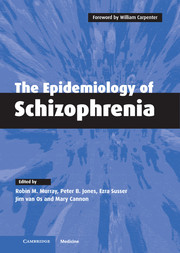Book contents
- Frontmatter
- Contents
- List of contributors
- Preface
- Foreword
- I The social epidemiology of schizophrenia
- II The developmental epidemiology of schizophrenia
- III The genetic epidemiology of schizophrenia
- IV Special issues in the epidemiology of schizophrenia
- Introduction
- 14 Mortality and physical illness in schizophrenia
- 15 The clinical epidemiology of suicide in schizophrenia
- 16 What is the relationship between substance abuse and schizophrenia?
- 17 Criminal and violent behaviour in schizophrenia
- V Future directions and emerging issues
- Glossary of epidemiological terms
- Index
16 - What is the relationship between substance abuse and schizophrenia?
from IV - Special issues in the epidemiology of schizophrenia
Published online by Cambridge University Press: 18 September 2009
- Frontmatter
- Contents
- List of contributors
- Preface
- Foreword
- I The social epidemiology of schizophrenia
- II The developmental epidemiology of schizophrenia
- III The genetic epidemiology of schizophrenia
- IV Special issues in the epidemiology of schizophrenia
- Introduction
- 14 Mortality and physical illness in schizophrenia
- 15 The clinical epidemiology of suicide in schizophrenia
- 16 What is the relationship between substance abuse and schizophrenia?
- 17 Criminal and violent behaviour in schizophrenia
- V Future directions and emerging issues
- Glossary of epidemiological terms
- Index
Summary
Abuse of alcohol and illicit drugs is on the increase in many parts of the world and, not surprisingly, people with psychosis participate in this general trend. But do people with schizophrenia abuse substances over and above the frequency of abuse in the general population, and, if so, do they abuse all or only some drugs? Unfortunately, much of the research in this area is subject to a range of methodological biases. First, these studies have commonly been carried out in unrepresentative samples such as inpatients in hospitals for veterans of the armed forces. Second, inadequate attention has often been paid to either the measurement of the substance abuse or the diagnosis of schizophrenia. Third, many samples mix together first-onset, relapsing and chronic patients. Fourth, very few studies are prospective.
Finally, even when the facts are established, they are often obscured by the clamorous debate between those who believe that substance abuse can cause schizophrenia and those who believe that schizophrenia predisposes to increase in abuse of substances. These opposing views are frequently held with a certainty that goes way beyond the evidence. As we shall see, different mechanisms may underlie the association between schizophrenia and substance misuse in different situations, and the way in which comorbidity develops may vary from substance to substance.
From an epidemiological point of view, there are a number of possible explanations for a reported association between a substance of abuse and schizophrenia (Thornicroft, 1990; Blanchard et al., 2000).
- Type
- Chapter
- Information
- The Epidemiology of Schizophrenia , pp. 317 - 342Publisher: Cambridge University PressPrint publication year: 2002
- 8
- Cited by



